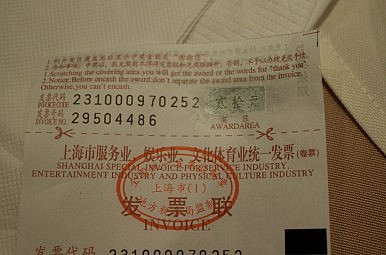It looks like you're using an Ad Blocker.
Please white-list or disable AboveTopSecret.com in your ad-blocking tool.
Thank you.
Some features of ATS will be disabled while you continue to use an ad-blocker.
China reshapes citizen compliance with positive reenforcement (Something the death penalty failed at
page: 14
share:
CHINA
Population : 1.351 Billion
Cash Transactions : 85% of all transactions
Unreported activity : est ~20-30%

INCENTIVE
Everything moves along so efficiently when there is incentive. China was having a major problem with business & income reporting for tax purposes. And even though they have laws on the books that could execute someone caught engaged in this activity, it was a very widespread problem.
They decided to go a different route and put in a new system that offers up each customer a chance in a lottery draw. Customers then suddenly cared about their receipts (who woulda thought?)
Seems to be working"
thediplomat.com...
Population : 1.351 Billion
Cash Transactions : 85% of all transactions
Unreported activity : est ~20-30%
The government started to address the problem by issuing mandatory receipt machines – known here as fapiao – which would record each transaction and could not be manipulated. Government officials could periodically check the machines to get a true picture of sales activity. The problem: businesses would simply refuse to use the machine. This is an issue of information asymmetry; short of stationing government monitors at each business, it was simply impossible to get accurate sales figures.
So China introduced a novel tactic: lottery tickets.

The government officially made each fapiao receipt a lottery ticket as well, in an attempt to compel customers to demand the receipt from businesses. The tickets are free for the customer and can in some cases win the holder up to 5,000 yuan.
INCENTIVE
Everything moves along so efficiently when there is incentive. China was having a major problem with business & income reporting for tax purposes. And even though they have laws on the books that could execute someone caught engaged in this activity, it was a very widespread problem.
They decided to go a different route and put in a new system that offers up each customer a chance in a lottery draw. Customers then suddenly cared about their receipts (who woulda thought?)
Seems to be working"
So far, the lottery receipts seem to be working. Using data from the program’s early years, Wan found that overall tax revenue and revenue in areas with the program was significantly higher than in areas without it. A report by the China Taxation Bureau from 2002, for instance, when the program was still in an experimental stage, showed that the total prize money was 30 million yuan ($4.88 million), compared to an estimated increase in tax revenue of 900 million yuan.
thediplomat.com...
Who knew, the temptation of free money was able to motivate the sheeple
a reply to: boncho
Bah every time I hear the word incentive it makes me feel like an animal.
This is you giving your dog a threat for doing a little trick. It works sure, but that says a lot about us and how far we have fallen.
In Belgium its the new big thing, we want you to work X amount of time longer unpaid but we will give you something for free that costs us nothing and you get the idea we care.
Still better that then a death penalty or torture... Even thought that would be more honest lol.
Bah every time I hear the word incentive it makes me feel like an animal.
This is you giving your dog a threat for doing a little trick. It works sure, but that says a lot about us and how far we have fallen.
In Belgium its the new big thing, we want you to work X amount of time longer unpaid but we will give you something for free that costs us nothing and you get the idea we care.
Still better that then a death penalty or torture... Even thought that would be more honest lol.
a reply to: MessageforAll
I assume there was always the incentive to not having your head cut off, or face the firing squad, but that didn't even give enough of one.
Offer up a couple bingo tickets though, and...
I assume there was always the incentive to not having your head cut off, or face the firing squad, but that didn't even give enough of one.
Offer up a couple bingo tickets though, and...
new topics
-
OK this is sad but very strange stuff
Paranormal Studies: 2 hours ago -
Islam And A Book Of Lies
Religion, Faith, And Theology: 3 hours ago -
Sorry to disappoint you but...
US Political Madness: 5 hours ago -
Watch as a 12 million years old Crab Emerges from a Rock
Ancient & Lost Civilizations: 10 hours ago
top topics
-
Sorry to disappoint you but...
US Political Madness: 5 hours ago, 13 flags -
Just Sick of It! Done! Can't take it anymore!
General Chit Chat: 17 hours ago, 9 flags -
ILLUMINATION: Dimensions / Degrees – Da Vincis Last Supper And The Philosophers Stone
Secret Societies: 16 hours ago, 9 flags -
Watch as a 12 million years old Crab Emerges from a Rock
Ancient & Lost Civilizations: 10 hours ago, 9 flags -
OK this is sad but very strange stuff
Paranormal Studies: 2 hours ago, 5 flags -
Islam And A Book Of Lies
Religion, Faith, And Theology: 3 hours ago, 3 flags
4
